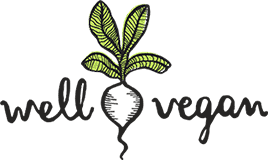Before I was vegan I was never one of those people who requested a glass of milk with dinner. It just wasn’t my thing. That being said, I can’t drink coffee without a little splash of something to make it palatable. And I need my coffee – daily. That’s why when I adopted a vegan meal plan one of the first things I did was start experimenting with different types of non-dairy milk. Back then my options were pretty much limited to soy milk and almond milk. There wasn’t much variety on the shelves of my grocery store.
Now, there are tons of non-dairy milk options for folks who follow a plant-based diet. So many, in fact, that it can be overwhelming. Between almond, hemp, cashew, coconut and all of the other varieties on the market it can be tricky to determine the kind that’s best for you. Fret no more!
In Well Vegan: A Starter Guide, we give you a comprehensive guide to non-dairy milk that matches up perfectly with your vegan meal plan. Here's a little taste of what you can expect to learn.
Soy milk
If you’re looking to add some extra protein to your diet, soy milk is your best bet. It has the highest amount of protein per serving of any of the non-dairy milks listed here.
Almond milk
For those who are counting calories, you’ve got a friend in almond milk. This non-dairy option has the lowest calorie count per serving, and is loaded with several of the vitamins and minerals vegans need to be healthy.
Coconut milk
Coconut milk is a great way to add a taste of paradise to your coffee, smoothie, or bowl of granola. Its creamy consistency also makes coconut milk a perfect dairy alternative in baking.
Hemp milk
Hemp milk is a good source of complete protein. It has a creamy consistency and a slightly nutty flavor – similar to almond milk. Hemp milk is also a great source of the omega-3 fatty acid ALA.
Cashew milk
Those who like making their own nut milks will love experimenting with cashews. They’re the easiest nuts to blend into milk because there’s no pulp to strain. Score! The store-bought variety is often fortified with calcium and vitamins A, D, and B12.
Rice milk
If you have a soy, nut, or gluten allergy, rice milk is the best choice for you. It has the lowest allergy risk of all the non-dairy milks listed here. When buying rice milk, be sure the variety you choose is free of xanthan gum, which can cause digestive upset.
Oat milk
Oat milk is high in fiber and boasts vitamin E and folic acid, which are essential nutrients for the nervous system. The only downside about oat milk is you probably won’t find it in a traditional grocery store. You’ll have better luck at a specialty health food store or by making your own oat milk at home.
Now, we know you’re going to be excited about what you read in Well Vegan: A Starter Guide, but please, please talk to your doctor before changing your diet and/or flushing your meds down the toilet. Got it? Good. With that disclaimer out of the way, download Well Vegan: A Starter Guide today to read more about how to make the switch to a vegan diet.



John
Interesting. You have a few types of milk here that I didn't know existed. Oat milk is the one I'd particularly like to try. Seems like it might be a good one for coffee.